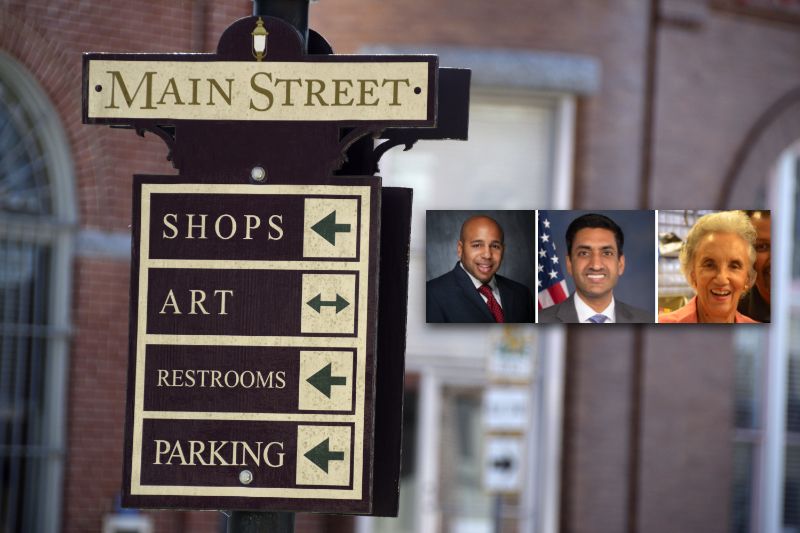Ethnic Businesses in The Post Pandemic: Catch the Boom or Left Behind?
(L-r) Everett Sands, CEO, Lendistry; Ro Khanna (D), Representative, California’s 17th Congressional District; Virginia Ali, Co-founder, Ben’s Chili Bowl
By Jenny Manrique, Ethnic Media Services
Since the pandemic started, 200,000 small U.S. businesses have closed permanently. Access to federal loans was limited. How can ethnic entrepreneurs stay afloat during the country’s economy reopening?
From its spot-on iconic U Street in Washington, D.C., Ben’s Chili Bowl has served diners for more than six decades: demonstrators from the civil rights march led by Dr. Martin Luther King, African Americans from segregated communities, tourists from all over the world, presidents and politicians.
Ben and Virginia Ali opened this place in 1958, and despite all the history it’s seen, its experiences in the last year were unique.
“Nothing has been as challenging as this pandemic — it’s been a very difficult time for us,” said Virginia Ali, 87. With her children, she continues running the small business that features a chili prepared with spices from Trinidad and Tobago, her husband’s native land. Ben Ali died in 2009.
“We have lost many friends, and seen the impact on many lives that depend on the Chili Bowl remaining open,” Ali said during an Ethnic Media Services-hosted press briefing. It focused on how COVID-19 has affected more than four million minority-owned U.S. companies whose annual sales total close to $700 billion, as well as their role in the looming economic opening.
“When the pandemic hit in March, we had the busiest schedule,” Ali said, “with two large groups of students coming to Washington. Even United Airlines had a story (about us) on the cover of its flight magazine, but we didn’t get the benefits of that because flights were no longer in the air.”
From having its business open almost 20 hours every day, the Ali family went to six days, offered curbside pickup and donated food to the Howard University Hospital and Washington Hospital Center medical staff, and to firefighters, teachers and protesters in the wake of George Floyd’s death.
“We began to receive letters and donations from all over the country, so we took those funds and gave back, preparing lunches for these front-line workers,” Ali added.
Ben’s Chili Bowl received a loan during the second round of the Paycheck Protection Program (PPP), a federal incentive to help small businesses continue to pay wages during the pandemic. The restaurant had to shift its focus to e-commerce in order to ship its famous smoked salmon with homemade hot chili sauce across the country, and the family plans to expand the franchise.
“We are still struggling, but it is good to know that there’s help available because all small businesses need it to survive,” Ali said.
May 31 was the last day for small business owners living in low-income neighborhoods to apply for the third round of PPP loans.
According to Everett Sands, CEO of Lendistry, a minority-led entity that helped thousands of small businesses secure these loans, COVID-19 exacerbated those enterprises’ already precarious situation. They had limited access to capital, lacked the infrastructure to apply for loans or contracts and couldn’t self-finance in the long term.
“We’ve been trying to educate small businesses about the different opportunities to receive capital, not only from federal programs, but from state programs,” Sands said, referring to initiatives in New York, Washington, D.C., and California, which offer guaranteed loans for micro-businesses that don’t have collateral. “As a result of the American Rescue Plan, most states received roughly a billion dollars to help these small businesses increase their revenues.”
Small Business Administration programs include loans, a restaurant relief fund and venture capital investments. To apply, a company need only show the sole proprietor’s gross revenue, and is not excluded if, for example, the proprietor has been guarantor on a defaulted student loan or has a criminal history.
“For amounts less than $150,000, most of the red tape or the bureaucratic process of a loan has been cleared away,” Sands explained. Nevertheless, he clarified that the remaining money available is for Community Financial Institutions and Minority Deposit Institutions or small banks, generally those with less than $1 billion in assets.
According to a University of California at Santa Cruz study, 41% of African American businesses and 32% of Latino businesses closed in the first months of the pandemic. Also, almost 40% of immigrant-owned businesses do not apply for loans because they believe they will be rejected.
In fact, many of the first PPP loans went to multi-million-dollar companies that had relationships with banks and staffed plants with as many as 500 employees, rather than to micro businesses like local dry cleaners or nail salons.
“It was particularly hard to access for black, brown and Asian communities,” said California Rep. Ro Khanna, a member of the Congressional Small Business Caucus. “And so I am a supporter of Rep. Ayanna Pressley and Vice President Kamala Harris’ bill that would set aside funds for these entrepreneurs of color.”
The Saving Our Street Act would allocate loans of up to $250,000 to businesses with fewer than 10 employees.
Khanna believes it is possible to distribute the money taking into account the racial and gender diversity of the business owners.
“In this next quarter, we’re going to have a pretty good recovery,” he said. “Consumer spending is at 10% growth. I think small businesses are going to come back strong. The problem is a lot of businesses that have had to close may not be able to reopen. And that’s where we have to focus: on assisting with debt forgiveness and capital for those businesses that would not survive.”


